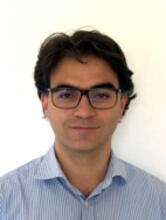The interaction between a peregrine falcon and a dove is visibly non-reciprocal. What happens to the well established framework of phase transitions in non-reciprocal systems far from equilibrium?
In this talk, I will answer this question by looking at three archetypal classes of self-organization out of equilibrium: synchronization, flocking and pattern formation. Simple demonstrations with robots will be presented along with naturally occurring phenomena from various domains of science that share a common feature: reciprocity has no reason to exist. In all these cases, the emergence of unique time-dependent many-body phases can be captured by combining insights from non-Hermitian quantum mechanics and bifurcation theory. This approach is a step towards a general theory of critical phenomena in systems whose dynamics is not governed by an optimization principle.
Host: Ben Machta (benjamin.machta@yale.edu)
The Colloquium series of the Yale Physics Department is called the Physics Club. The name dates to the late 1890s, the era of J Willard Gibbs, who influenced the intellectual life at Yale through a number of “graduate clubs”. He was one of the founders of the Mathematics Club which originated in 1877; he served as its executive officer for ten years. The Physics Club first met on the evening of Oct. 31, 1899, with 13 in attendance. Ever since, Physics Club has met regularly through each academic year, though in a break with tradition, we do no meet on the evening of Halloween. (Reference: Suha Gürsey, The History of Physics at Yale 1701-1970 (c) 2000.)
Physics Club is a weekly colloquium of general interest to the Department of Physics, Applied Physics, Astronomy, and Mathematics. The series is aimed at graduate students, postdoctoral researchers, research staff and faculty. For more information, or to request a Zoom link to attend, please send an E-mail with your name and institutional affiliation to Taylor Dunnigan, Departmental Events Coordinator.
Physics Club: Vincenzo Vitelli, University of Chicago, “Non reciprocal phase transitions”
Event time:
Monday, March 28, 2022 - 4:00pm to 5:00pm
Location:
Online ()
Event description:
Contact:
(see "Description" above)
